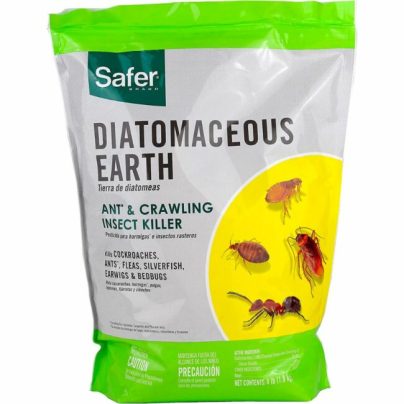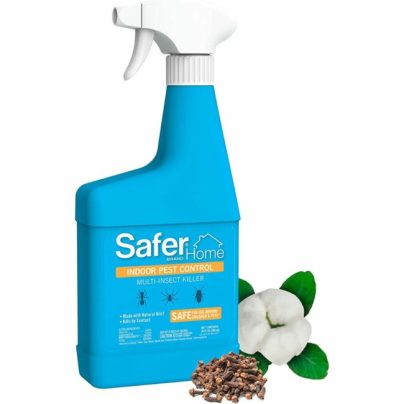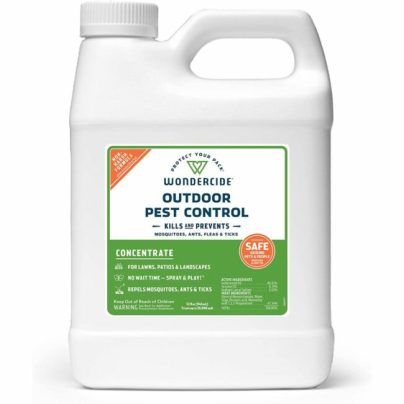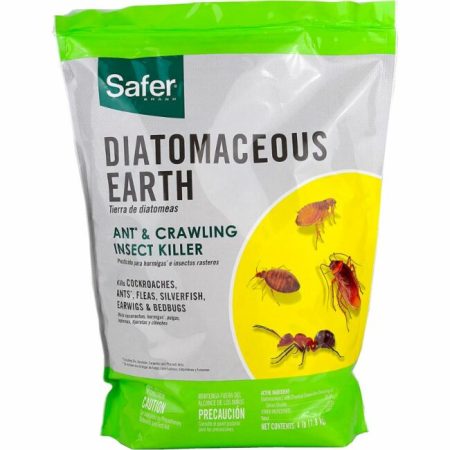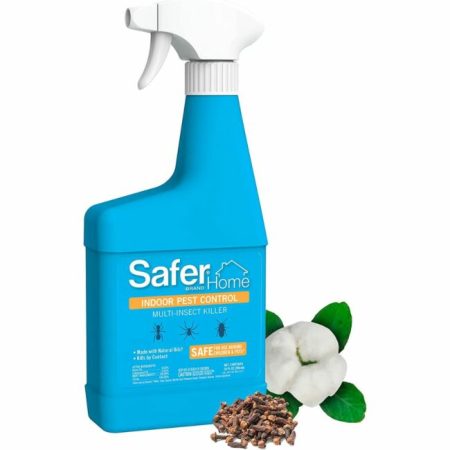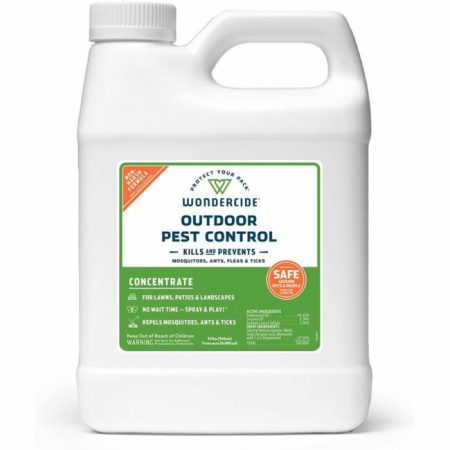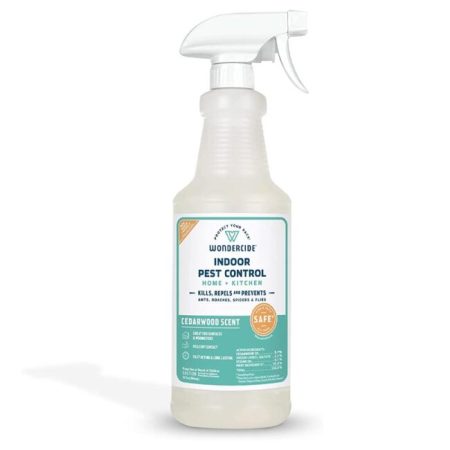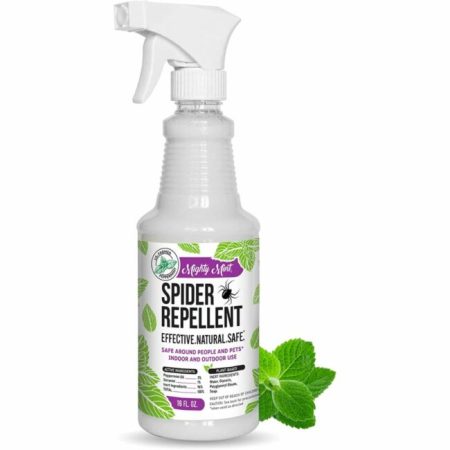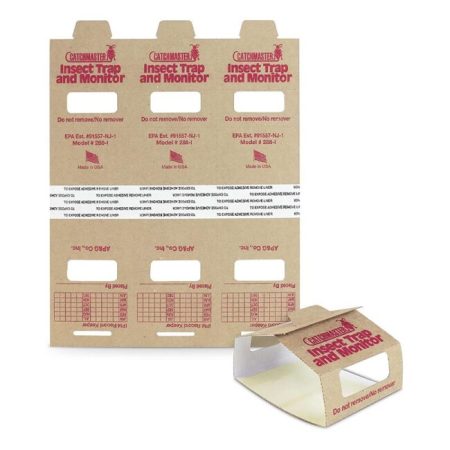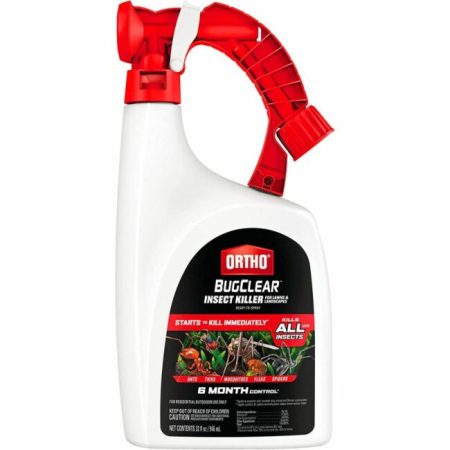We may earn revenue from the products available on this page and participate in affiliate programs. Learn More ›
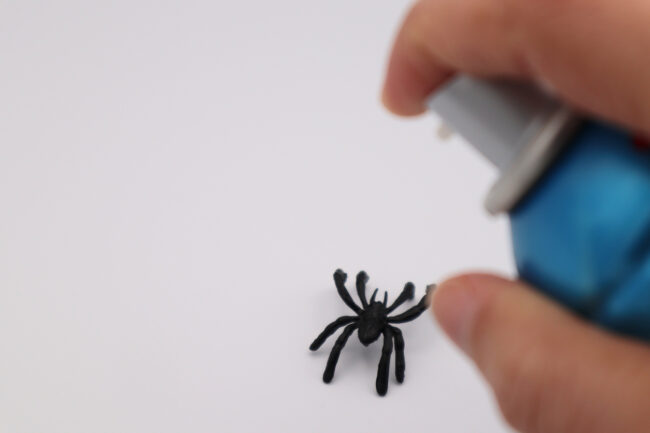
North America is home to 3,000 species of spiders. The vast majority of these arachnids are not dangerous; they’re more a nuisance than reason for concern. However, a few species—among them brown recluse spiders and black widow spiders—can cause real harm, though bites are rarely fatal.
Whether your goal is to eradicate an infestation, keep dangerous local species at bay, or simply avoid the fear and annoyance spiders can instill, an efficient pest control program may be necessary. The best spider killer may contain either potent chemicals or natural compounds and can work well for repelling or killing spiders for days, weeks, or months after application.
Keep reading to learn about insecticide spray, dust, glue traps, and natural insect repellents. With the shopping considerations below, choose the most suitable product among some of the most effective solutions for insect control below.
- BEST OVERALL: Safer Brand Diatomaceous Earth Insect Killer
- BEST BANG FOR THE BUCK: Safer Brand Home Indoor Pest Control Spray
- UPGRADE PICK: Wondercide Outdoor Pest Control Concentrate
- BEST REPELLENT: Wondercide Indoor Pest Control Spray
- BEST SPRAY: Mighty Mint Spider Repellent Peppermint Oil Spray
- BEST TRAP: Catchmaster Spider & Insect Glue Traps
- BEST FOR LAWNS: Ortho BugClear Insect Killer
Before You Buy a Spider Killer
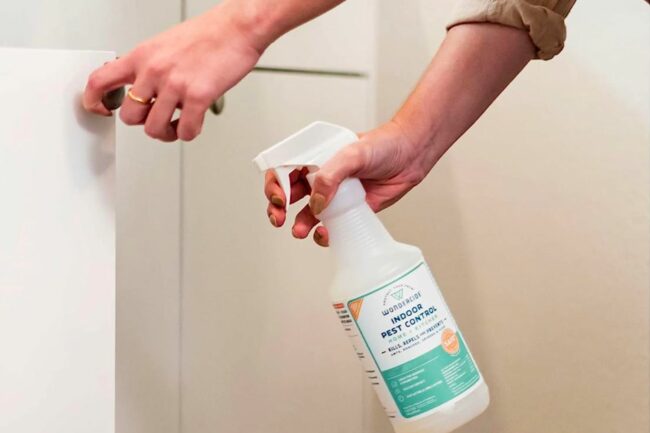
We interviewed James McHale, entomologist and president of JP McHale Pest Management based in Buchanan, New York, who says there are about 10 spider species that are common around the home. “Brown recluse and black widow are the most concerning, although black widow spiders are not really indigenous to the Northeast.” He adds that “most species are beneficial, eat other insects, and are not incredibly harmful.”
Homeowners who decide to deal with a spider problem will want to take into consideration that killing spiders with insecticides isn’t ideal for every situation or family—especially since spiders are generally considered beneficial. Still, those who’d prefer to keep creepy crawlies at bay may wish to consider a pest repellent. Some repellents may not work by deterring spiders directly, but instead keep their food sources—i.e., prey—away. Without an ample supply of insect snacks, spiders aren’t likely to settle in the home.
However, if the home is kept clean and free from clutter, spiders won’t find the abode as appealing. We talked with Tim Sherrer, an ACE-certified entomologist and owner of Expest Exterminating in Athens, Georgia, who confirmed this. His top recommended preventative measures include:
- Minimizing the population of other bugs around the home
- Keeping trees and shrubs well trimmed and back from the house
- Eliminating clutter and cardboard boxes (good hiding places for spiders)
- Making sure windows, cracks, and gaps to the exterior are sealed and secured
These steps can help homeowners maintain a spider-free area after having cleared them out with one of our recommended spider killers.
How We Chose the Best Spider Killers
We thoroughly evaluated the key aspects that are included in many of the best spider killers, including versatility, type, quantity, and effectiveness. Our top picks can provide the successful removal of many household and outdoor pests.
Many of the options in our lineup offer quick and long-lasting results and can also kill pests such as cockroaches, fleas, crickets, and scorpions. Plus, some of these options are nontoxic or humane, meaning fewer chemicals in a home or outdoor spaces for the safety of pets and children.
Finally, many of the best spider killers listed above also come in budget-friendly, large-quantity options or two-packs for long-lasting use in the event of reinfestation. However, since some of our picks are chemical-based solutions, they should always be used and stored only as directed for safety.
Our Top Picks
Given the variety of natural and chemical-based products, there are numerous options available for both outdoor and indoor pest control. These insect solutions are among the best in their categories and can help win the war against eight-legged pests.
Best Overall
Safer Brand Diatomaceous Earth Insect Killer
See ItProduct Specs
- Type: Natural insecticide powder
- Key ingredient(s): Diatomaceous earth
- Also good for: Cockroaches, bed bugs, fleas, earwigs, silverfish, millipedes, and centipedes
Pros
- Natural, safe way to kill spiders and various insects; also works on bed bugs, silverfish, fleas, and more
- Kills spiders in 48 hours for fast eradication after application
- Stain-free formula is safe for most surfaces; suitable for indoor or outdoor use
Cons
- Requires reapplying, especially in drafty areas; may need to be affixed if used outdoors
For those looking to end their spider population problem without introducing harmful chemicals into the environment, diatomaceous earth is a solid option. This natural spider repellent consists of the fossilized remains of microscopic aquatic organisms; it infiltrates insects’ and spiders’ exoskeletons, dehydrating them from the inside out and killing them within about 48 hours.
Diatomaceous earth is not harmful to humans or companion animals, providing a safer pest solution for homes with pets and young children. Also, since it doesn’t stain, diatomaceous earth is safe for use on most surfaces. Just recognize that because the product comes in a powder form, drafty areas could require frequent reapplication.
Get the Safer Brand diatomaceous earth spider killer at Amazon.
Best Bang for the Buck
Safer Brand Home Indoor Pest Control Spray
See ItProduct Specs
- Type: Natural spray
- Key ingredient(s): Natural oils, including clove and cottonseed
- Also good for: Ants, silverfish, roaches, and fleas
Pros
- Natural spray kills insects without harsh odors, stains, or residues
- Safe to use around the home, even with children and pets running around
- Works quickly; kills most insects within 3 minutes
Cons
- Not an effective pest repellent; once dried, insects will be unaffected by where you sprayed
With the Safer Brand indoor pest control spray, affordability meets efficacy, making it the ideal choice for a safe and effective pest-control solution in your home. Say farewell to unwanted insects and embrace a healthier, pest-free living space. With its rapid action, this powerful spray eliminates spiders and other pests within just 3 minutes, providing you with quick and effective relief.
What sets Safer Brand apart is its commitment to using natural oils, avoiding harsh chemicals that can be harmful to your family and pets. This natural spray harnesses the power of plant-based ingredients, so you can have peace of mind knowing that you’re protecting your loved ones without compromising their well-being.
Additionally, this spray leaves no residue behind, ensuring a clean and fresh environment. Say goodbye to unsightly stains or sticky surfaces. The spray conveniently targets spiders and other insects, delivering results while keeping your home looking its best.
Get the Safer Brand indoor spider killer at Amazon, The Home Depot, or Safer Brand.
Upgrade Pick
Wondercide Outdoor Pest Control Concentrate
See ItProduct Specs
- Type: Natural insecticide spray
- Key ingredient(s): Cedarwood oil, sesame oil, sodium lauryl sulfate
- Also good for: Mosquitoes, ants, fleas, ticks, roaches, flies, scorpions, crickets, no-see-ums, gnats, and more
Pros
- No wait is required before using treated areas; simply put into a sprayer and apply
- Made from essential oils that are safer than chemical pesticides; ideal for those living near wildlife
- A single application can last up to 30 days for peace of mind and convenience
- Treats up to 21,000 square feet; suitable for large outdoor spaces
Cons
- Outdoor use only; may not be ideal for some users’ preferences
When there are concerns about children or pets coming in contact with harmful chemicals in the yard, Wondercide’s EcoTreat spray may be the answer. This outdoor pest control formula is made from essential oils, and folks can use the outdoor area immediately after applying the product rather than waiting, which is required for some pest control sprays.
Wondercide consists of cedarwood oil, sesame oil, and sodium lauryl sulfate. It’s effective against a host of insects that spiders eat, including mosquitoes, ants, fleas, ticks, roaches, flies, scorpions, crickets, and more. With these bugs removed from the yard, spiders won’t have a sustainable food source and are likely to move on. Each application can last up to 30 days, and one 32-ounce bottle can cover up to 21,000 square feet of yard. Just keep in mind it is not for indoor use.
Get the Wondercide outdoor spider killer at Amazon.
Best Repellent
Wondercide Indoor Pest Control Spray
See ItProduct Specs
- Type: Natural insecticide spray
- Key ingredient(s): Cedarwood oil, sodium lauryl sulfate, sesame oil
- Also good for: Ants, roaches, flies, fleas, ticks, wasps, scorpions, mosquitoes, fruit flies, silverfish, moths, and more
Pros
- No harsh chemicals; formula is safe for indoor use around wildlife, children, and pets
- Repels not only spiders but also their food sources for the complete eradication of pests
- 1 application can last 4 weeks, but daily use is safe and effective
Cons
- May stain delicate fabrics and rugs; may not be ideal for use around outdoor upholstered furniture
Wondercide’s indoor pest control spray is worth considering for parents and pet owners looking for a safer way to repel spiders and their food sources. This formula consists of cedarwood oil, sodium lauryl sulfate, and sesame oil, and it works to repel spiders, ants, roaches, fleas, ticks, wasps, scorpions, mosquitoes, fruit flies, silverfish, moths, and other insects.
Safe for spraying on indoor surfaces like baseboards, windows, doors, counters, cabinets, and other hard surfaces, Wondercide can, however, stain delicate fabrics and rugs. Though a single application can keep on repelling for as long as 4 weeks, this indoor pest control is safe enough to use daily to get rid of spiders.
Get the Wondercide indoor spider killer at Amazon.
Best Spray
Mighty Mint Spider Repellent Peppermint Oil Spray
See ItProduct Specs
- Type: Natural insecticide spray
- Key ingredient(s): Peppermint oil
- Also good for: Spider mites and other crawling insects
Pros
- Extra-concentrated formula deters spiders as well as spider prey
- Safe for use around pets and children and can be used indoors and out
- Spray bottle reduces setup and preparation; allows for easy application
Cons
- Strong peppermint scent may not be ideal for some users’ preferences
Those looking for a safe, plant-based spray to repel spiders, spider mites, and insects may want to check out Mighty Mint spider repellent. This highly concentrated recipe, which relies on peppermint essential oil to repel spiders, can be used inside and out, and it’s completely safe to use around pets and children.
Spray Mighty Mint around the exterior of the home or any space inside the home. This pest repellent spray is only effective for 2 to 3 days, so although frequent use is safe, it can get expensive. Plus, those who don’t enjoy the smell of peppermint may be as turned off as spiders!
Get the Mighty Mint spider repellent at Amazon.
Best Trap
Catchmaster Spider u0026 Insect Glue Traps
See ItProduct Specs
- Type: Glue trap
- Key ingredient(s): Adhesive, molasses, nonallergenic peanut scent
- Also good for: Crawling insects
Pros
- Flexible application styles allow for use in various areas
- Formula safe for indoor areas with pets and kids; design folds into a tunnel
- Catches spiders and other crawling insects for added versatility
Cons
- Can lead to an unsightly pile of dead bugs wherever it is placed
Even the safest sprays may make some users uncomfortable about applying them in kitchen cabinets, pantries, counters, and other food-related areas. As an alternative to sprays, consider Catchmaster’s spider and insect traps, which don’t use any airborne or surface-clinging chemicals. Instead, these sticky traps have a glue surface that lures the likes of spiders, ants, silverfish, cockroaches, and more with molasses and a nonallergenic peanut scent.
The application style for these spider killer traps is flexible: Leave them unfolded for plenty of horizontal surface area, fold them over to protect the adhesive in dusty areas, or remove the backing from the adhesive mounting strips and stick them to walls and under shelves. The downside of these sticky traps is that some folks may be averse to seeing a pile of dead bugs on the sticky traps.
Get the Catchmaster spider killer at Amazon.
Best for Lawns
Ortho BugClear Insect Killer
See ItProduct Specs
- Type: Hose-attached insecticide spray
- Key ingredient(s): Bifenthrin
- Also good for: Ants, armyworms, beetles, caterpillars, chinch bugs, crickets, earwigs, flies, moths, scorpions, ticks
Pros
- Single application can last up to 6 months for user-friendliness
- Can prevent an infestation or treat an active insect issue
- Works on lawns, flower beds, and home foundations
Cons
- Runoff from this product may be harmful to waterways; not as eco-friendly as some comparable options
Keeping a lawn bug-free can seem like an impossible task, but BugClear insect killer from Ortho can help. This fast-acting spray attaches to a garden hose to quickly treat lawns, vegetable gardens, flower beds, and home foundations. Users can even apply it to vegetables as long as they wait the predetermined length of time to harvest them (detailed on the product label).
BugClear’s main active ingredient is bifenthrin, which is excellent for pest control. This chemical treatment creates a barrier against ants, armyworms, beetles, caterpillars, chinch bugs, crickets, earwigs, flies, moths, scorpions, ticks, and spiders. One application can last up to 6 months to prevent or wipe out an active bug issue. Shoppers will want to note that this product can be very harmful to waterways; therefore it should be used responsibly and never to the point of runoff, or before or during rain.
Get the Ortho spider killer at Amazon or Ace Hardware.
Or, DIY Your Own Spider Killer
For those who don’t want to spend money on spider killers, they can make their own with a few common ingredients.
- 1 cup of water
- 1 cup of white vinegar
- 1 tablespoon of dish soap
Mix the ingredients in a spray bottle for the easiest application method. Spray spiders and the areas they inhabit—around windows, baseboards, and areas where the invaders build spider webs. Vinegar will kill spiders as well as ants, wasps, earwigs, flies, and more.
If a repellent is preferred instead of a killer, mix the following ingredients in a spray bottle and use it around windows, doors, baseboards, and other areas where spiders may frequent or travel.
- 7 drops of either peppermint, tea tree, citrus, lavender, or cedarwood essential oil (it’s okay to use several of these oils as well)
- 1½ cups of warm water
- 1 teaspoon of dish soap
Jump to Our Top Picks
Our Verdict
There are several common spider-killer options on the market, such as Raid and Terro spider killer. However, they do not meet our sustainability guidelines and are not included in our list of recommendations due to the harmful chemicals used, which can cause damage to nearby aquatic ecosystems and friendly insects such as bees. These products are also aerosols, which pose their own risks to the environment if they use any volatile organic compounds as the propellant.
What to Consider When Choosing a Spider Killer
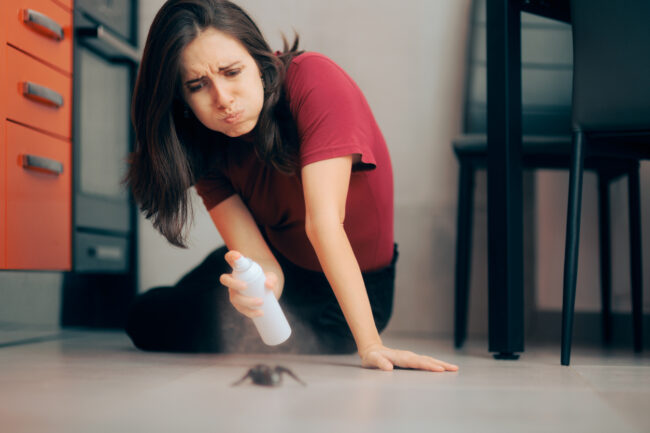
Keeping spiders away from the house and yard provides added peace of mind. However, there are a variety of types and ingredients to consider before choosing the right killer for current or potential spider infestations. Here are a few things to keep in mind while shopping around for pest control.
Types of Spider Killers and Repellents
Pest control companies market a variety of products to control spider and spider mite issues. While many of these products work, some may be better suited for a particular set of needs than others. The best spider sprays, dust, and glue traps work in different ways, but all serve the same purpose—repelling or killing spiders.
Insecticide Dust
Natural spider killers for both indoors and outdoors may be diatomaceous earth. This compound contains fossilized aquatic organisms, available in dust (powder) form. Diatomaceous earth causes insects to dry out and die by absorbing oils and fats from their exoskeleton.
This versatile, nontoxic product exterminates spiders and other insects including bed bugs, cockroaches, fleas, and ants. The natural dust starts to work within 48 hours, and since the compound does not break down, it’s effective as long as it stays dry.
Users can spread diatomaceous earth in a thin layer around plants, on the lawn, or anywhere else they want to get rid of spiders. While this product is considered safe, be careful during application, as it can irritate the skin and eyes.
Spider Sprays
Natural pest control concentrates and sprays repel spiders without the use of synthetic chemicals or other potentially harmful ingredients. These products offer a safer option for indoor use, particularly in households with young children or curious pets.
Natural spider killers are also available, and these products contain chemicals that can kill spiders in one spray. They can also treat areas where spiders may frequent or return. Their applications typically last longer than repellents as well.
Popular spider killer spray ingredients include bifenthrin, pyrethrin, and deltamethrin. These chemicals kill spiders by disrupting their central nervous systems until they eventually die, but they are considered generally unsafe if ingested or inhaled by people and pets.
Spider Traps
Traps are another safe means of controlling crawling pests in the home. They have a sticky surface that lures and catches bugs, holding them in place until they die. The best options fold up to keep pets and children from touching the sticky surface.
The added benefit of folding spider killer traps is that users won’t see a pile of dead bugs on the floor—and they’re also less disgusting to pick up and throw away. Place them along walls and baseboards where bugs are likely to travel.
Spider Repellents
Some folks appreciate spiders’ beneficial characteristics and prefer to simply shoo them and their food sources away from their homes rather than kill them. Those who feel that way may want to consider a spider repellent rather than a killer.
Most spider repellents consist of natural essential oils such as peppermint, cedarwood, lavender, sesame, and other bug-repelling oils. The spiders (and the food sources they prey on) find these substances unappealing, causing them to run from the treated area. As a natural product, they may require more frequent reapplication than other spider killers, but they’re generally safe for pets and children.
Ingredients & Scent
The top spider killers on the market range from synthetic to all-natural formulas for killing, catching, or repelling not only spiders but other crawling insects. Some of the most common ingredients used in spider killers are Diatomaceous earth, synthetic pesticides and adhesives, peppermint, cedarwood, and sesame oil, or molasses. For users that prefer a non-chemical approach to pest control, ensure that the option you choose is made with organic or all-natural ingredients.
Some popular spider killers on the market use a scent to lure spiders and either catch, kill, or repel them. The most popular scents are either synthetic or all-natural and have peppermint, molasses, and/or peanut smells for attracting spiders or powerful floral or lemon scents for repelling.
Ease of Use
Most spider killers on the market are made to be easy to use with their trap, spray, or powder application types. Each of these options is a reliable source, but some options may be easier to use than others. Insecticide dusts and sprays are among the easiest options since they need to be applied as needed and last for long-term effects. But, homes with children and pets may not prefer the insecticide dust route since it can be kicked up and moved with foot traffic or consumed by curious pets.
Alternatively, repellents and traps also have the set-and-forget constructions users love but are less likely to cause any risk or lose their effectiveness if moved or knocked around.
Placement & Safety
Spiders have a pesky way of climbing into the house and then hide and create spider webs in high locations, making it hard to catch or kill them. Plus, keeping spider killers around the house may be a point of concern with children and pets running around.
While some options are all-natural and/or organic and will not cause any harm to humans or pets, many options have a covering or case to keep poison contained.
FAQs
If you’re new to DIY extermination, you may want to consult these answers to commonly asked questions about spider killers. If you have additional questions, contact the manufacturer of the product you purchase.
Q. What is a natural repellent for spiders?
Peppermint essential oil and vinegar are natural, safer alternatives to chemical spider repellents. However, natural repellents do not last as long. Mighty Mint spider killer is a potent and pleasant-smelling spray that effectively repels spiders for 2 to 3 days.
Q. Where should I apply spider killer?
You can spot-spray a single spider, or treat your foundation, windows, doors, and other places where arachnids gather, like cracks, crevices, and crawl spaces.
Q. Is spider spray safe to keep in the home?
Natural spider sprays containing peppermint oil or vinegar are very safe. When used and stored correctly, chemical insecticides are safe. Precautions for storing insecticide spray include:
- Store pesticides where children and pets cannot reach them. Ideally, pesticides should be stored in a locked cabinet in a well-ventilated room.
- Never store insecticides near food or medical supplies.
- Store flammable liquids and aerosols away from ignition sources such as cars, grills, and lawn mowers.
Q. How do you dispose of empty insecticide spray cans?
To safely dispose of an empty can of spider spray, rinse the exterior of the container and cap over the sprayer. Dispose of the cap as you would regular household waste and dispose or recycle the container based on its material. All aerosol cans can be recycled once empty.
Q. How do you properly dispose of insecticides?
Unused insecticides should never be poured into sinks, drains, or toilets. This can contaminate local waterways as well as harm wildlife. According to the Environmental Protection Agency, pesticides cannot be eliminated from most municipal drinking water.
To dispose of pesticides, follow the instructions on the product label. These are usually indicated in a “Storage and Disposal” statement on the product label.
Q. How can I prevent a recurrence of spiders?
Treat the exterior of your home according to the manufacturer’s suggestions. The label usually has a treatment interval listed, so adhere to it when you’re putting together your DIY pest control plan.
Why Trust Bob Vila
Bob Vila has been America’s Handyman since 1979. As the host of beloved and groundbreaking TV series including “This Old House” and “Bob Vila’s Home Again,” he popularized and became synonymous with “do-it-yourself” home improvement.
Over the course of his decades-long career, Bob Vila has helped millions of people build, renovate, repair, and live better each day—a tradition that continues today with expert yet accessible home advice. The Bob Vila team distills need-to-know information into project tutorials, maintenance guides, tool 101s, and more. These home and garden experts then thoroughly research, vet, and recommend products that support homeowners, renters, DIYers, and professionals in their to-do lists.
